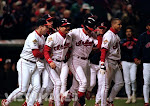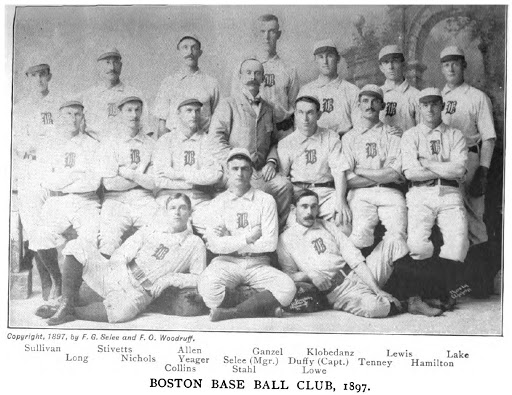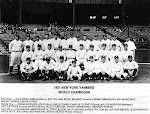So, in addition to the OOTP league with all-time great teams of the DH era, which I'm playing out a day at a time and have been blogging about in some detail, I also started another OOTP league at some point in the last couple of months (I don't remember when and don't know if it's easily retrievable). This league has a starting point in 1915 and I'm planning to play it out for a while (at least I'm planning that right now). I originally conceived it as a bit of a science experiment to test whether the Federal League should be considered a major league, but I quickly pivoted to the league structure I'm using, which can't really answer that question but will I think be more interactive and fun. I do hope to answer the original question at some other point, using a different setup (but still with OOTP). For lack of a better, catchier name, I'm calling the league I'm running "Alternate 1915".
What Actually Happened: The Federal League, as you may know, was a challenger to the American and National Leagues that was founded in 1913, started raiding the major leagues for players in 1914, held two seasons, and folded at the end of 1915. There are lots of stories and books about the Federal League, suffice to say that they convinced some number of major leaguers to jump to their league, but not really big stars. The Federal League had a huge influence on baseball history, but ultimately they ran out of money faster than the established leagues and when peace was made after the 1915 season, it was without any of the Federal League teams surviving (though two Federal League owners ended up buying the Browns and Cubs as part of the aftermath).
Premise: In real life, the Federal League sued the American/National Leagues, and the judge in charge of the case slow-walked things. In the end, that judge became baseball commissioner a few years later. Whether there were shenanigans involved or not, the premise here is that a different judge is in charge of the proceedings and conveys to everyone that it'd really be best if they worked it all out themselves because otherwise who knows what would happen. So, peace is hammered out shortly before the 1915 season begins, with the four Federal League teams in otherwise-unoccupied cities (Baltimore, Buffalo, Newark, and Kansas City) getting absorbed into the National League (the first two) and American League (the second two), and the four Federal League teams in cities with American and/or National League teams (Brooklyn, Pittsburgh, St. Louis, and Chicago) being dissolved with their players becoming free agents*.
Peace came too late for Connie Mack, who had already begun dismantling the Philadelphia Athletics dynasty that had dominated the AL for several years.
What I'm doing: I started a game with the 1915 teams and historical minor leagues, which for OOTP includes the Federal League. I promoted the four Federal League teams that I mentioned, then disbanded the Federal League and made their players free agents. I'm allowing the computer-run teams to do transactions as they see fit. Also, things will be integrated from the start. It's a better world than ours was. It's a 162-game schedule, with each team playing each other one 18 times.
Premise: In real life, the Federal League sued the American/National Leagues, and the judge in charge of the case slow-walked things. In the end, that judge became baseball commissioner a few years later. Whether there were shenanigans involved or not, the premise here is that a different judge is in charge of the proceedings and conveys to everyone that it'd really be best if they worked it all out themselves because otherwise who knows what would happen. So, peace is hammered out shortly before the 1915 season begins, with the four Federal League teams in otherwise-unoccupied cities (Baltimore, Buffalo, Newark, and Kansas City) getting absorbed into the National League (the first two) and American League (the second two), and the four Federal League teams in cities with American and/or National League teams (Brooklyn, Pittsburgh, St. Louis, and Chicago) being dissolved with their players becoming free agents*.
Peace came too late for Connie Mack, who had already begun dismantling the Philadelphia Athletics dynasty that had dominated the AL for several years.
What I'm doing: I started a game with the 1915 teams and historical minor leagues, which for OOTP includes the Federal League. I promoted the four Federal League teams that I mentioned, then disbanded the Federal League and made their players free agents. I'm allowing the computer-run teams to do transactions as they see fit. Also, things will be integrated from the start. It's a better world than ours was. It's a 162-game schedule, with each team playing each other one 18 times.
I'm a Yankees fan, so I'm managing the Yankees. I'm totally taking advantage of knowing the future, though I don't think the future necessarily must play out in the game the way it does in real life. Babe Ruth will clearly be an amazing hitter, but I don't know that the Yankees will get a chance to put him in pinstripes. I spotted Home Run Baker on the free agents list and (accidentally) made him the highest-paid player in the game. I also worked a low-level trade that netted Dazzy Vance. Both of them really were Yankees in 1916, so getting them a bit early doesn't tweak things too much. However, I also got Eddie Plank and Harry Heilmann as free agents. Plank is nearing the end of his career, while Heilmann was a well-regarded prospect. Neither future Hall-of-Famer was ever a Yankee in reality.
Current Situation: The real Yankees were pretty mediocre in 1915, finishing in 5th place at 69-83 and 32.5 games behind the pennant-winning Red Sox. Their Pythagorean record was 77-77, so they either got unlucky or had some other structural thing going on. Boston won the league with a .669 winning percentage. Here in Alternate 1915, the Yankees are 80-55 in late August, 12 games behind Boston and in 3rd place. Boston has a fight on its hands, though, as they've been trading the lead back and forth with the Chicago White Sox. At the moment Chicago is 1 game back. The Boston Rustlers have a comfortable lead in the National League, with the Giants 7.5 games back in 2nd place and the Phillies (who won in real life) mired in 5th 12 games back.
Current Situation: The real Yankees were pretty mediocre in 1915, finishing in 5th place at 69-83 and 32.5 games behind the pennant-winning Red Sox. Their Pythagorean record was 77-77, so they either got unlucky or had some other structural thing going on. Boston won the league with a .669 winning percentage. Here in Alternate 1915, the Yankees are 80-55 in late August, 12 games behind Boston and in 3rd place. Boston has a fight on its hands, though, as they've been trading the lead back and forth with the Chicago White Sox. At the moment Chicago is 1 game back. The Boston Rustlers have a comfortable lead in the National League, with the Giants 7.5 games back in 2nd place and the Phillies (who won in real life) mired in 5th 12 games back.
The new teams have been bad, but not embarrassingly so. Newark is the worst and deep in 10th place, but certainly isn't historically bad. Kansas City is in 7th place, and is clearly better than the teams below it. Baltimore and Buffalo are in 7th and 8th in the NL, but are clearly of different caliber--Baltimore has been flirting with .500, while Buffalo is close enough to last place that it may end up there.
The new Yankees have been a bit of a mixed bag. Heilmann has been great, and Plank has been the ace of the staff. Baker, however, has spent a lot of time on the Injured List and is not playing up to his usual standards. Vance has stayed on the reserve roster, though I plan to bring him up when rosters expand in a few days.
Future: At this point, I'm imagining this as a long-term project. The real-life Yankees didn't win a pennant until 1921 and didn't win a World Series until 1923. I'm hoping to be able to get ahead of that schedule, but I'm not sure how realistic that is--while I took advantage of Connie Mack's fire sale I don't have any particular reason to think that the sweetheart relationship the Red Sox and Yankees had in the late teens (of which Ruth switching teams was just a piece) will actually be present in the game, nor will the Black Sox scandal. Nor am I guaranteed to get Lou Gehrig, say. So I need to keep an eye out for opportunities when I see them. Since I'm still a newb with OOTP we'll see how that goes.
Future: At this point, I'm imagining this as a long-term project. The real-life Yankees didn't win a pennant until 1921 and didn't win a World Series until 1923. I'm hoping to be able to get ahead of that schedule, but I'm not sure how realistic that is--while I took advantage of Connie Mack's fire sale I don't have any particular reason to think that the sweetheart relationship the Red Sox and Yankees had in the late teens (of which Ruth switching teams was just a piece) will actually be present in the game, nor will the Black Sox scandal. Nor am I guaranteed to get Lou Gehrig, say. So I need to keep an eye out for opportunities when I see them. Since I'm still a newb with OOTP we'll see how that goes.
I've also put a bunch of semi-quantitative thought into how the majors might or might not expand or have teams relocate in this universe. That's fodder for another post or two, but having Baltimore and Kansas City already full in 1915 plus having not three but four teams in the NYC area seems like it'll certainly affect the first wave of relocations. I'm also debating if/how the not-awful conclusion of things from the standpoint of the Federal League could lead to further expansion much sooner than historically.
*In reality, it doesn't necessarily make sense that the players became free agents, but it was an easy way to handle things at the start.










